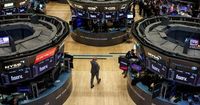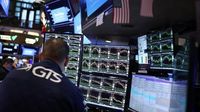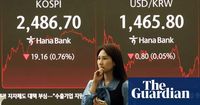Global markets were severely rattled on April 3, 2025, following President Donald Trump’s announcement of sweeping tariffs on imports, which many fear could trigger a global recession. The Dow Jones Industrial Average plummeted by 1,679 points, or 3.98%, while the broader S&P 500 and tech-heavy Nasdaq indices experienced declines of 4.84% and 5.97%, respectively. These losses mark the largest single-day drops for all three major indexes since the onset of the COVID-19 pandemic in March 2020.
As the effects of Trump’s tariffs reverberated across the globe, European markets mirrored the chaos, with the STOXX 600 index tumbling by 2.57%, erasing gains made since January. Germany’s DAX index fell 3%, France’s benchmark index slumped 3.31%, and Italy’s index saw a decline of 3.6%, all marking their most significant single-day drops in months. In Asia, Japan's Nikkei 225 sank 2.77%, while Hong Kong's Hang Seng index fell 1.52%.
The tariffs, which impose a minimum of 10% on nearly all goods entering the United States, have sparked fears of retaliatory measures from trading partners, raising concerns about a potential trade war that could stifle global economic growth. The U.S. dollar also faced pressure, falling to its weakest level since October 2024, as investors reacted to the uncertainty surrounding Trump's new trade policies.
Market analysts are warning that the tariffs could result in a staggering $660 billion increase in taxes on American consumers annually, significantly impacting the Consumer Price Index and leading to a surge in inflation. “The impact on inflation will be substantial,” noted JPMorgan analysts, who raised the likelihood of a U.S. recession to 60%, up from 40% prior to Trump’s announcement.
In the wake of these developments, investors have flocked to safe-haven assets such as gold, which surged to a record high of $3,167.50 per troy ounce, reflecting a 19% increase this year. The fear of economic turmoil has also driven Treasury bond yields lower, with the yield on the 10-year Treasury note falling to 4.05%, its lowest level since October 2024.
Despite the turmoil, Trump remains optimistic about the U.S. economy, stating, “It’s going to be a booming country. A very booming country. It’s going to be amazing, actually.” He likened the economy to a “sick patient” that has just undergone an operation, suggesting that the long-term effects of the tariffs would ultimately bolster the economy.
However, many market experts express skepticism. Michael Block, a market strategist at Third Seven Capital, criticized the administration's approach, stating, “They’re ignoring every rule of classic micro and macro economics. This is the policymaking equivalent of a suicide bomber.”
In addition to the immediate market reactions, the tariffs have raised concerns about the long-term implications for U.S. manufacturers, workers, and families. The Business Roundtable, a group of influential CEOs, cautioned that the tariffs could severely harm American businesses and lead to retaliatory measures from foreign nations.
As global markets brace for further impacts from the tariffs, the chances of interest rate cuts by central banks have risen sharply. Money markets are now pricing in a 92% chance that the European Central Bank will lower interest rates at its upcoming meeting, up from 80% earlier in the week. Similarly, the likelihood of a Bank of England rate cut in early May has increased to 77%.
In Australia, the ASX 200 futures are pointing to losses of at least 1% on April 4, 2025, as investors digest the implications of the tariffs. Earlier this week, the Reserve Bank of Australia (RBA) had already kept interest rates on hold at 4.1%, but financial markets are now anticipating a 90% chance of a rate cut in May, with additional cuts expected by August and November.
Notably, the tariffs have led to a significant decline in stock values for major companies that rely heavily on international supply chains. Apple saw its stock plummet by 9.3%, while Nike tumbled 14.4%. Best Buy and Ralph Lauren also experienced substantial losses, with declines of 17.8% and 16.3%, respectively.
As the situation continues to develop, analysts are closely monitoring the potential for further market volatility. The Cboe Volatility Index, often referred to as Wall Street's fear gauge, surged by 39.6% on April 3, reflecting heightened anxiety among investors. With Trump’s tariffs set to reshape the global trade landscape, the coming weeks will be crucial in determining the trajectory of both the U.S. and global economies.
In summary, President Trump’s recent tariff announcement has sent shockwaves through global markets, raising fears of a recession and prompting significant sell-offs across major indexes. As the world grapples with the implications of these trade policies, the uncertainty surrounding future economic conditions remains palpable.







